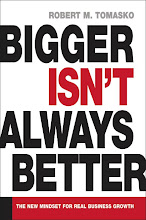August 08, 2008
Faith-based economics
Each damaged company – and sector of the economy – has it’s own story to tell. Many of these (the home mortgage crisis, the airline industry’s free fall, the Detroit automakers’ demise, Starbucks’ slump) have been well documented in the business press. But some of the underlying dynamics, less so.
Many accounts of the housing bubble/mortgage crisis/credit crunch focus on greed as the primary culprit. True, greed has been in ample supply throughout this mess, but there is another key contributor that is often overlooked – the rise of “faith-based economics.”
Economics should be an evidence-based behavioral science. But in recent past decades it has also morphed into a quasi-religious belief system.
Its main pillar is belief in the market. Markets are wonderful mechanisms for information processing and goods exchange. But they are things to observe, study and use - not deify. They can be manipulated and they do fail (an entire industry, social entrepreneurship, has been built around market failures).
A corollary to market-worship is an uncritical belief in the goodness of deregulation – the less fettered the market, the better for all concerned, or so goes the mantra.
Of course this is a pile of nonsense. Totally unregulated markets are at the mercy of bullies and thugs. And they make no economic sense in many types of industries.
My account of how constraints guide sustainable growth in Bigger Isn’t Always Better quotes a famous conservative British politician:
Excesses of self-defeating self-interest can’t be wished away by believing they don’t exist. They need to be channeled in constructive directions, and restrained when they can’t. This is something Winston Churchill, author of those words, understood well.
In addition to his call for a “strict and well understood system” I’d add intelligent. Too many regulatory regimes have been designed in dumb and thoughtless ways, leaving them open to well-justified criticism, thereby feeding proponents of deregulation-as-religion.
Combine the widespread rationalizing use of economics-as-a-belief-system with an unquestioned and popular Federal Reserve chief overfeeding the capital markets (possibly for reasons of political partisanship and personal ideology) and you have a formula for economic disaster.
Which is what we have on our hands.
Josef Ackerman, CEO of Deutsche Bank whose missteps and complex financial engineering helped propel the current crisis, also seems to have come around to this point of view in a New York Times interview:
Ackerman is right. It required a near-impossible-to-summon degree of discipline for Wall Street to practice smart self-restraint when the belief-guided, chief federal regulator was talking temperance while continually refilling the drunkard’s glass.
Link
Many accounts of the housing bubble/mortgage crisis/credit crunch focus on greed as the primary culprit. True, greed has been in ample supply throughout this mess, but there is another key contributor that is often overlooked – the rise of “faith-based economics.”
Economics should be an evidence-based behavioral science. But in recent past decades it has also morphed into a quasi-religious belief system.
Its main pillar is belief in the market. Markets are wonderful mechanisms for information processing and goods exchange. But they are things to observe, study and use - not deify. They can be manipulated and they do fail (an entire industry, social entrepreneurship, has been built around market failures).
A corollary to market-worship is an uncritical belief in the goodness of deregulation – the less fettered the market, the better for all concerned, or so goes the mantra.
Of course this is a pile of nonsense. Totally unregulated markets are at the mercy of bullies and thugs. And they make no economic sense in many types of industries.
My account of how constraints guide sustainable growth in Bigger Isn’t Always Better quotes a famous conservative British politician:
“We are for private enterprise, with all its ingenuity, thrift and contrivance …
“ … and we believe it can flourish best within a strict and well-understood system of prevention and correction of abuses.”
Excesses of self-defeating self-interest can’t be wished away by believing they don’t exist. They need to be channeled in constructive directions, and restrained when they can’t. This is something Winston Churchill, author of those words, understood well.
In addition to his call for a “strict and well understood system” I’d add intelligent. Too many regulatory regimes have been designed in dumb and thoughtless ways, leaving them open to well-justified criticism, thereby feeding proponents of deregulation-as-religion.
Combine the widespread rationalizing use of economics-as-a-belief-system with an unquestioned and popular Federal Reserve chief overfeeding the capital markets (possibly for reasons of political partisanship and personal ideology) and you have a formula for economic disaster.
Which is what we have on our hands.
Josef Ackerman, CEO of Deutsche Bank whose missteps and complex financial engineering helped propel the current crisis, also seems to have come around to this point of view in a New York Times interview:
“But it’s not only the banks that made mistakes,” he said. “Monetary policy was clearly very generous for a very long time, and helped to create these kinds of bubbles. The regulatory framework had deficits too.”
Ackerman is right. It required a near-impossible-to-summon degree of discipline for Wall Street to practice smart self-restraint when the belief-guided, chief federal regulator was talking temperance while continually refilling the drunkard’s glass.
Link
